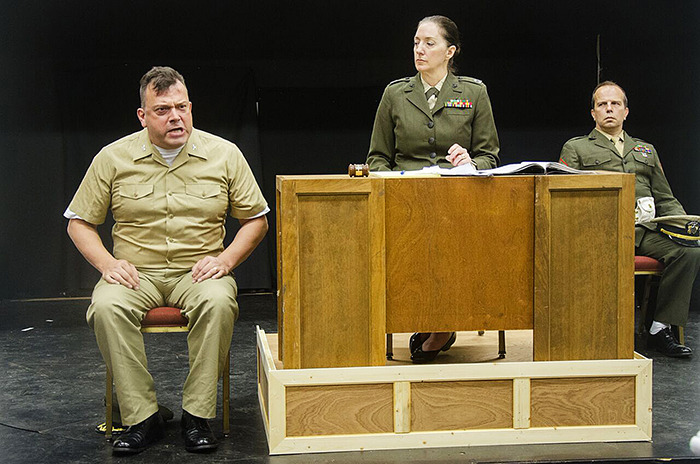Defence attorney, Lieutenant Daniel Kaffee, put Colonel Nathan Jessup on the stand with the aim of provoking him to disclose that he had ordered the Code Red.
Jessup took the bait, lost his cool, flamed Kaffee, admitted to his actions, defended his dogma, and … was charged.

Scene from A Few Good Men in which Jessop is losing his cool and spilling the beans. Play written by Aaron Sorkin, directed by Reg Parks. Theatre in the Country.
That’s the unravelling of a great story. First a film, A Few Good Men was made into a play, which I experienced in Maple Ridge last night. My friends acted in it — Grant Vlahovic as Captain Jack Ross and Halia Hirniak as Doctor Stone.
The story was fresh in my mind when I woke up this morning to news that the 2016 Republican candidate for president of the U.S.A., Donald Trump, had once again gone off script. Well, one could say that he improvised the script that Hilary Clinton baited him to read. For at the end of the first presidential candidates’ debate earlier this week, Ms. Clinton called out Trump for having, some time ago, belittled the 1996 Miss Universe winner, Alicia Machado, for having gained weight.
This morning over Twitter, Trump once again betrayed his personality and attitudes towards women. I won’t dignify his most recent outrageous comments about Ms. Machado by quoting him (there are references below). It’s the general pattern of Trump’s tirades that is pertinent to this post.
Here is a man who has been accused by the media of several significant crimes (none proven in court to my knowledge), who has put himself and his past behavior in the spotlight, and who can predictably be provoked. Will his latest outburst prove to be his undoing? Hard to say. However, the Republicans clearly need the electoral support of women and Hispanics, many of whom, along with millions of others (one would hope), will be put off by his outbursts —baited or not.
This brings me to one of the main questions with which CogZest is concerned: using knowledge to become profoundly effective, the subtitle of Cognitive Productivity. Cognitive Productivity deals with factual and practical knowledge as inputs to learning. It is not terribly difficult to convince people of the importance of becoming better at improving ourselves with factual and practical information.
But learning from art is a harder sell. For the most part, we experience film, music, and other forms of art for short-term affective experience (thrills, pleasure, etc.) Yet, latent in great art are knowledge gems.
It’s more difficult to extract knowledge from art than from expository artifacts. Art has several pedagogical advantages, however, over expository information. Art can elicit emotion, and emotions can help instill memory.
Nothing comes for free. Without cognitive effort, the possibility of learning from art is minimal. When’s the last time that you avoided a major mistake by thinking of a comparable situation in art? Have you recently looked back on a mistake you’ve made and thought to yourself: If only I had applied the lesson from such or such a novel, film or song? Considering how much fiction is consumed in the Western world, such applications are not as frequent an experience as one might expect or at least wish.
Some experts claim that art effects personal change tacitly, without the need for one to explicitly remember or apply it. We allegedly often avoid disasters, and make better decisions, because we have implicitly absorbed lessons through art. Their arguments I find weak.
The modern Western world, as I know it, treats art, as I alluded to above, as an instrument of short-term affect and socialization. Contrast First Nations, who deliberate teach stories, not merely for pleasure (though surely for pleasure and social reasons too), but as learning tools.
- Had Mr. Trump seen A Few Good Men last night, would he have held his offensive opinions about Alicia Machado from Twitter?
- What have those of us who experienced A Few Good Men learned from it?
- What have we learned, to the point of applying it in our every day lives when it matters, from the more than a few great writers of fiction whose masterpieces we have enjoyed?
- How can we learn more efficiently from art without spoiling our enjoyment? (Some of this of course is quite obvious: Reflectively thinking, discussing and writing about art… )
- Can this potentiate our enjoyment?
- What mechanisms of mind are engaged in the process of deep, successful learning from art?
Those are questions raised by the project of Learning from Art. My first book around this topic will be Discontinuities: Limerence, Art and Mind.
Links
- Associated Press (2016-09-30) Trump shames ex-beauty queen for sexual history show.
- Chozick, A. and Grynbaum, M. M. (2016-09-30) ‘She Has a Name,’ Alicia Machado, and It Is Everywhere. NY Times
- Barbaro, M. (2016-09-30) Shamed and Angry: Alicia Machado, a Miss Universe Mocked by Donald Trump.
- A Few Good Men.
- Hall, M. (2016-09-14) A Few Good Men, and women in Country. Maple Ridge News

One thought on “What Can Be Learned from a Few Good Men that Trump Did Not?”